Soviet Prison
My great-grandmother and grandmother — and other members of the family, perhaps — were apparently tried on the same day as their criminal records have identical entries: “Convicted on February 25, 1946 by the special council of NKVD of the USSR, and sentenced to a term of 5 years. The term is to be counted from August 4, 1945.”
“NKVD” is People's Commissariat of Internal Affairs, the predecessor of KGB. Also, in Russia a prison term is counted from the day one is arrested, not convicted.
Then they were transported to a prison camp in cattle cars. They were not given any water, but at one station guards let my grandmother draw a kettle of water. Her father happened to be in the same train, and he saw her, and cried, “Daughter, bring me some water, we are dying here!” The guards let her — they were so kind, kindness is our national trait, — but other convicts in the car took the kettle from her farther, and he did not get any water. The guards saw that and let my grandmother draw another kettle, and then they beat up the overly thirsty prisoners and made sure her father got this kettle all for himself.
He has died in the camp.
During this transportation the family was split. Grandmother's younger brother, who was eleven, was taken by some other family. Great-grandmother's sister was shipped to a camp somewhere in Soviet Far East. And great-great-grandmother — the one that had been wealthy before the revolution — was sent to a camp near Murmansk, in Northwestern Russia. That is the second of the only two mentions of her I have ever heard. And it came up in a little story of how her daughter, my great-grandmother, collected and mailed potato peels to her — there was nothing to eat in Murmansk, you see. I do not know how exactly one prisoner could mail potato peels to another across the country — maybe, it happened in exile already, not in the prison camp, — but that is the little story I have been told.
Apparently, great-great-grandmother has died in Murmansk.
From the same criminal record: “Released on June 24, 1950. Exiled.” Exile in reality meant that they were left in the same place where the prison camp was, but they did not have to stay in the camp itself. But they had to report to the police weekly and could not leave the place at all. At about that time grandmother's younger brother, who was 16 already, rejoined them. Great-grandmother's sister also came from her camp in Far East.
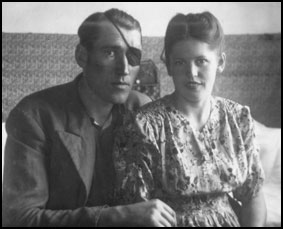
My grandfather, born 1919, and grandmother. In exile. This shot was taken on May 28, 1953.
While still in the prison camp, grandmother met my grandfather, who was doing time for approximately the same thing. He was born in 1919. By that time he already had a son from his previous marriage, born in about 1946. Grandfather was divorced — I guess they simply had not imprisoned his wife, that is all.
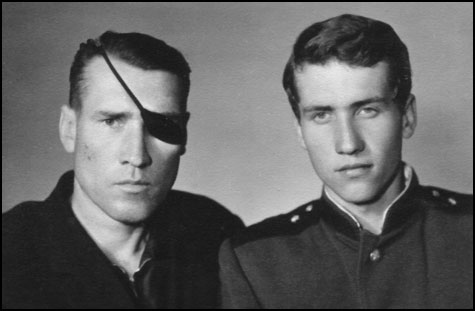
Grandfather and his son from the previous marriage. That is a military uniform — compulsory draft, no doubts. July 1, 1965.
When I was little, for a long time I thought for some reason that grandfather had lost his eye in an accident in a coal mine. I guess that was induced by a book I had read about two coal miners having been buried in a mine after an accident, and they both had coal dust in their eyes, and one of them patiently waited for the rescue crew to find them and wash his eyes, and the other one began rubbing them — and lost them. This is the stuff they give you to read in Russia when you are little, by the way. So, I thought that was the case with my grandfather, too.
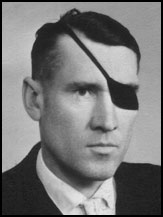
Grandfather, 1967
But in reality he was kind of a foreman in the prison camp and managed work of other convicts, and two of them did not like his directions, so they took axes and axed my grandfather. One blow came to the kidney and another one to his head. But he managed to grab one of the guys and kept him between himself and the other one, and then people ran over to them.
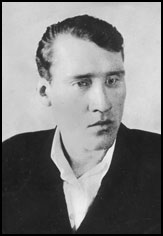
A picture with an artificial eye, year unknown
There is only one picture where he wears a glass eye, but I personally have never seen him do that.
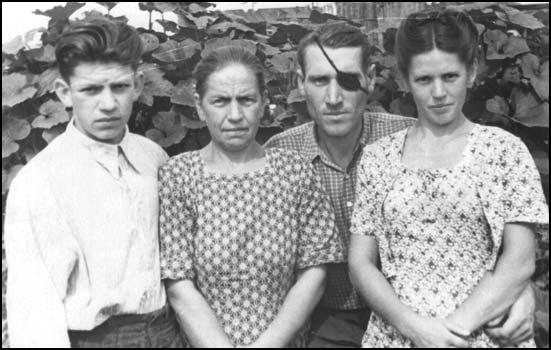
Grandfather and grandmother, already married, then her mother and brother on the left. September 30, 1953.
next: Exile
more: Other Things
this page: http://www.zharov.com/kampf/camp.html
copyright: © Sergei Zharov, text, design, code, 2004–2024
feedback: sergei@zharov.com
